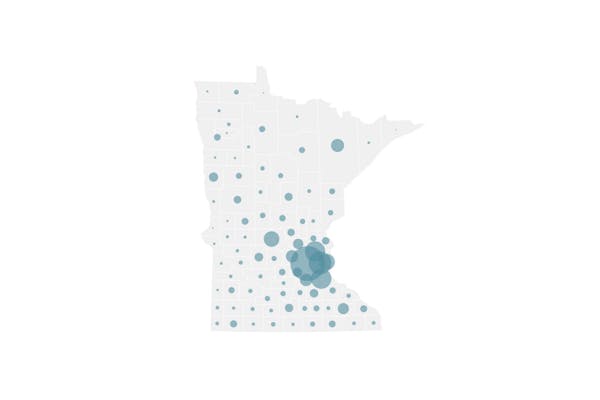Principal Roberto Cantu donned his plastic face shield and greeted students by name as they jumped off the bus at Poplar Bridge Elementary School in Bloomington on Tuesday morning. Each student carried a backpack stuffed full of the items — tablets, art supplies and books — they had used for at-home learning.
"It's like our fourth first day of school," Cantu said, referring to the school's switches between distance, hybrid and now full in-person learning so far this school year.
Tuesday marked the first phase of bringing many of Minnesota's elementary students back into school buildings. In addition to Bloomington, districts including Anoka-Hennepin, Osseo, South Washington County, Elk River, Robbinsdale and Wayzata are welcoming back kindergartners and first- and second-graders this week, with older elementary students moving from distance to in-person learning in February.
The reopening of so many schools is a major shift for the state, where schools' decisions about moving between distance, hybrid and in-person learning have been primarily based on how much the coronavirus is spreading in local communities.
Gov. Tim Walz is permitting all elementary schools to reopen as soon as this week, as long as they follow the state's safety guidelines.
State officials said they changed course for elementary schools because the first months of the school year have provided more insight into how the virus spreads within school buildings. They also cited the impact of distance learning on academics and students' mental, emotional and physical health.
Elementary schools, where students typically stay with one group of students and one teacher all day, present less risk of virus outbreaks than secondary schools.
Minneapolis and St. Paul schools are set to bring elementary students back in February, though teachers unions in both districts are pushing back and calling for a delay until additional safety protocols are in place and more educators have access to the vaccine.
Walz announced Monday that teachers are among those eligible for the expanding COVID-19 vaccination program. But supplies so far are limited and the priority will be elementary or other teachers doing in-person instruction. For instance, 47 doses were allocated for Osseo schools, 80 for Anoka-Hennepin and 18 for Bloomington schools.
Heidi Jo Servaty, a first-grade teacher at Elm Creek Elementary in Maple Grove, said she would have preferred to get vaccinated before returning to in-person classes on Tuesday. But she was excited — and emotional — when she saw her full classroom.
"I didn't cry, but I feel like I could," Servaty said. "To have my group back all together for the first time is amazing."
Families still have the option of choosing to keep their student in distance learning rather than sending them to in-person classes. Spokesmen for Anoka-Hennepin and Bloomington school districts estimated that about 30% of their elementary students will continue online learning at home.
The districts also noticed more parents dropped their students off at school rather than sending them on the bus.
Kari Swenson, of Crystal was among the last of the parents to drop off a child at Sonnesyn Elementary in New Hope on Tuesday.
Her son Avery, 4, is a preschooler who skipped distance learning. The morning marked his very first day in a classroom.
Swenson acknowledged she'd initially been hesitant to choose in-person instruction but went ahead after participating in video chats with the school principal.
Before heading inside, Avery paused for his "first day" photo in his face mask. "He's excited," Swenson said.
Many of the teachers at Poplar Bridge Elementary spent Tuesday morning helping their students understand the new routines and why parts of the school may look different.
Per the state guidelines, teachers and other staff members are "strongly recommended" to wear both face masks and clear face shields, and plexiglass barriers are installed in areas where teachers can't maintain social distancing from students. Testing for COVID-19 will be available to staff every two weeks.
Meals at the Bloomington elementary school are now grab-and-go style and most students eat in their classrooms.
Kindergarten classrooms have clear plastic shower curtains hanging from the ceiling to provide a barrier between students sitting at the same table. In the other classrooms, students were assigned duties like "desk checker," meant to help ensure the desks stay on their marks 3 feet apart.
Still, the energy of having students back in the building wasn't dulled by the repeated reminders of the pandemic.
As Ruth Haugstad gathered her kindergarten students to start their day, one of the boys wiggled in his seat and blurted out: "My mom said we get to come to school for five days."
Haugstad smiled and assured him that his mom was correct — the class will be able to learn together, in-person, every weekday.
Staff writer Erin Golden contributed to this story.
Mara Klecker • 612-673-4440
Anthony Lonetree • 612-673-4109

'Safe recovery sites' would offer syringes, naloxone and more to people using drugs. The plan could be in peril.
New Minnesota GOP leaders seek peace with party's anti-establishment wing

Who is Republican Lisa Demuth, Minnesota's first House speaker of color?

